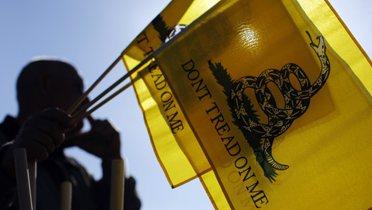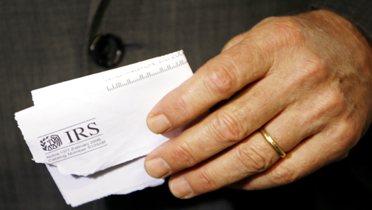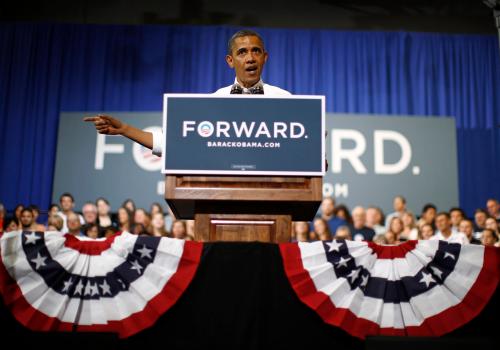The already heated fight over the so-called Bush tax cuts, which are set to expire at the end of this year, ratcheted up another notch on Monday. The White House and a host of influential Congress members staked out competing positions on the issue that is likely to dominate the debate over the economy from now until the November midterm elections.
The standoff amounts to a game of political chicken, but it also raises questions about what is best for pulling the country out of the recession, chipping away at unemployment and paying down the deficit.
In comments at a backyard town hall in a Northern Virginia suburb, President Obama delivered another pointed defense of his plan to extend the cuts for middle class and working families, while letting others—specifically the cuts for high-income earners—come to an end.
“We could get [tax cuts] done this week, but we’re still in this wrestling match with John Boehner and Mitch McConnell about the last 2 to 3 percent” of upper-income taxpayers, Obama said.
Up on Capitol Hill, a spokesman for McConnell, the Senate GOP leader, said that every Senate Republican has pledged to oppose Obama’s plan.
“Only in Washington could someone propose a tax hike as an antidote to a recession,” McConnell, R-Ky., said.
Neither man, however, has the full support of his party, as politicians on both sides of the aisle worry about how the issue will play out with recession-weary voters.
McConnell’s comments came one day after House Minority Leader Boehner (R-Ohio) said he would support renewing tax cuts for the middle class but not the wealthy if that was his only choice.
Meanwhile, Politico reported Monday that some Democrats are now pressuring Speaker Nancy Pelosi to extend the cuts for all brackets, another indication that the debate is causing a rift between the party’s vulnerable moderates and safe liberals. And the Associate Press reported that Senate Democrats such as Kent Conrad of North Dakota, Evan Bayh of Indiana and Ben Nelson of Nebraska are siding with Republicans against raising taxes on anyone during a fragile economic recovery.
Just what are the cuts being debated? Here’s a brief guide to the issue.
What are the Bush tax cuts?
The cuts in question are tax changes that were enacted during the Bush administration that dramatically cut income and estate tax rates and revenues. The key bills were passed in 2001 and 2003.
The 2001 tax package was especially sweeping. Its two most prominent changes were a cut in individual income tax rates and a phase-out—and one-year repeal—of the estate tax. The top rate for taxpayers in the highest bracket dropped from 39.6% to 35%, while the rate for the next bracket down fell from 36% to 33%.
The 2003 tax cut reduced the income tax rates applied to long-term capital gains and dividends. Prior to 2003, long-term capital gains were taxed at 20 percent, and dividends were taxed at regular income tax rates. The 2003 legislation dropped the rate on most long-term capital gains and dividends to 15 percent.
Why is this happening now?
If Congress doesn’t extend the cuts, most households will see their taxes go up in 2011. Rates will automatically snap back to those in effect before the cuts were passed.
The reason: Congressional budget rules make permanent tax cuts that are not paid for by spending reductions or other tax increases difficult to pass. Because of these rules, the Bush administration and Congress were forced to pass “temporary” tax cuts and schedule them to expire at the end of 2010.
The timing of the tax cuts’ expiration creates a challenge for Congress and the Obama administration. Policymakers must weigh the potential short-term consequence of derailing a fragile economic recovery against the pitfalls of extending costly tax cuts that contribute to increasing budget deficits. And two months before an election, no politician relishes telling voters that taxes must go up.
What are the alternatives?
Alternatives to a full extension of the tax cuts have received substantial attention. President Obama has called for extension of the cuts on income below certain thresholds: $200,000 for single taxpayers and $250,000 for married taxpayers but ending them for higher income levels.
Former Obama administration budget director Peter Orszag recently endorsed extending the Bush tax cuts for both middle-income taxpayers and the wealthy for two years, if that’s what’s necessary to get a deal in Congress. But he argued they should then be phased out for everyone once the economy improves. Orszag’s reasoning was that temporary extension of the tax cuts would keep the economy humming during the recovery, but that a more permanent extension of the tax cuts—even if limited to middle-income households—was simply unaffordable because of the impact on the deficit.
This concern has been echoed by other prominent economists. Martin Feldstein, a senior adviser to the Reagan administration, also supports allowing the tax cuts to expire after a two-year extension. Alan Greenspan, former chairman of the Federal Reserve, called an extension of the Bush tax cuts without corresponding spending reductions “disastrous.”
This perspective differs sharply from that of some congressional leaders, such as Boehner and McConnell, who support the permanent extension of the tax cuts. Boehner, however, appears to have stated that he would support the president’s plan over the alternative of not extending the tax cuts at all, though the interpretation of what he meant is still up in the air.
Can we afford to keep the tax cuts in place? What would each cost?
The 2001 and 2003 tax cuts are quite expensive in terms of lost revenue. Extending the lower tax rates on income would cost about $1.6 trillion over 10 years. A host of other measures that were part of the legislation—a higher exemption for married couples, the extension of the estate tax cuts at the 2009 level, the lower rates on capital gains and dividends, and a higher Child Tax Credit—would result in a revenue loss of about $300 billion each over the next decade.
Combined, extending the Bush tax cuts would cost about $3 trillion over 10 years; limiting the tax cuts to middle-income households would lower this cost by about $700 billion. Either way, that total would be added to the deficit.
Since the federal government is projected to run budget deficits throughout the remainder of the decade, extending these cuts means borrowing more to pay for existing government services. Some economists already are concerned that the debt level is so high that it could lead to a catastrophic outcome.
But isn’t it bad to raise taxes in a recession?
If stimulating the economy is the goal, there are more effective ways of doing so. Extending all of the Bush tax cuts would have a small bang for the buck in terms of stimulus, the equivalent of a 10- to 40-cent increase in Gross Domestic Product for every dollar spent, according to the Congressional Budget Office. Why? As the CBO notes, most Bush-tax-cut dollars go to higher-income households, and these top earners don’t spend as much of their income as lower earners.
The CBO recently examined 11 potential stimulus policies; of those, extending all of the Bush tax cuts tied for the lowest bang for the buck. Letting the high-income tax cuts expire and using the money for aid to the states, extending unemployment insurance benefits, and tax credits that aid job creation all scored higher. Dollar for dollar, each of these measures would have about three times the impact on GDP as continuing the Bush tax cuts.
Will raising the top tax rates hurt small business?
One of the most common objections to letting the cuts expire for those in the highest tax brackets is that it would hurt small businesses. Sen. Orrin Hatch (R-Utah) recently said that allowing the cuts to lapse would amount to “a job-killing tax hike on small business during tough economic times.”
This claim is debatable. Less than 3 percent of tax returns reporting small-business income are filed by taxpayers who fit Obama’s definition of a “high-income” taxpayer.
According to the nonpartisan Tax Policy Center, small-business income makes up a majority of the income for about 40 percent of households in the top bracket and a third of households in the second-highest bracket. Based on this analysis, if the objective is to help small businesses, continuing the Bush tax cuts on high-income taxpayers isn’t the way to go.
Moreover, much small-business income is taxed at low or zero rates right now. Small business also fully deduct wage payments, so a higher tax rate should not impact their choice of hiring people.
What’s going to happen?
The next few weeks will be marked by political maneuvering, as members of Congress and the administration keep one eye on the upcoming elections and the other eye on the economy. Gridlock is one possible outcome, with a decision not coming until a post-election session. Neither side wants to be seen as adding to the deficit, nor do they want to be blamed for everybody’s taxes going up—especially the taxes paid by the middle class.










Commentary
Op-edA Guide to the Fight Over the “Bush Tax Cuts”
September 13, 2010